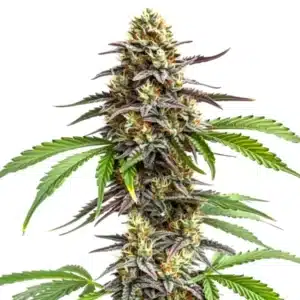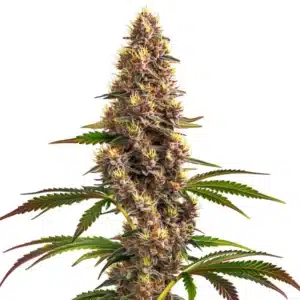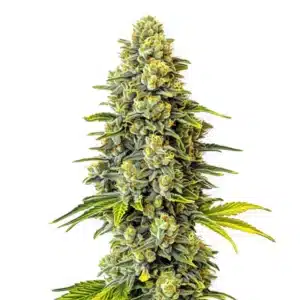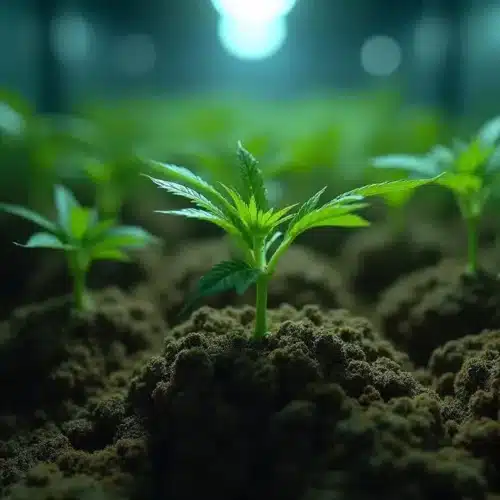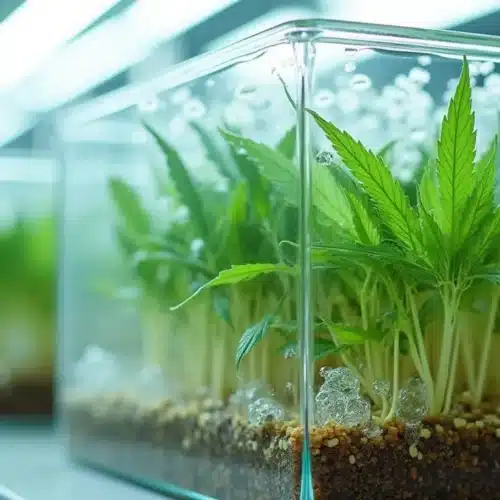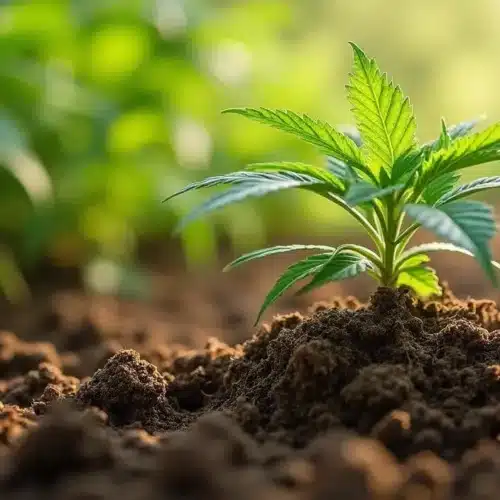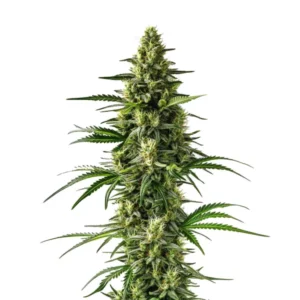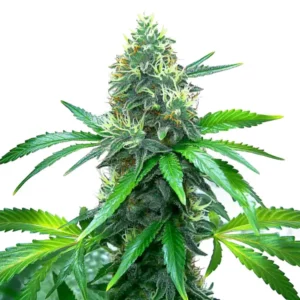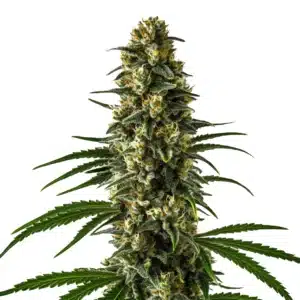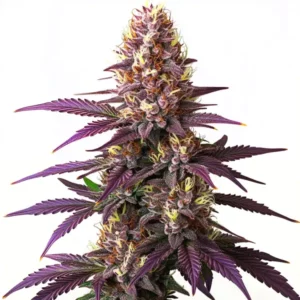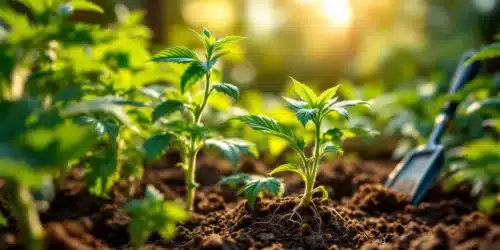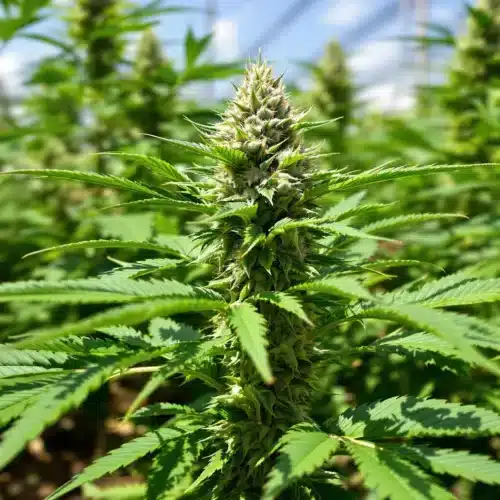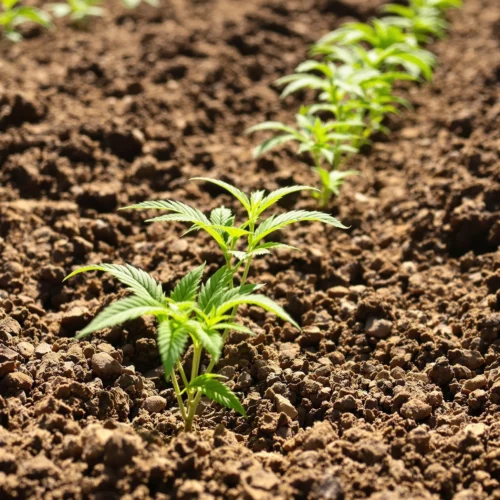When it comes to cultivating marijuana outdoors, one of the most crucial factors is the choice of soil. The Best Soil for Growing Weed provides essential nutrients, proper aeration, and optimal drainage, all of which contribute to healthy and robust cannabis plants. In this guide, we’ll explore the best soil options for outdoor marijuana cultivation to help you achieve a successful and bountiful harvest.
Choosing the Right Soil Blend
Organic vs. Potting Mix: Which is the Best Soil for Growing Weed?
When it comes to choosing the best soil for growing weed, one of the primary decisions you’ll face is whether to go with an organic blend or a potting mix. Each option comes with its own set of advantages and considerations, making the choice a crucial one for the success of your cannabis garden.
Recommended Strains
Cafe Racer
 THC: 25%
THC: 25% Type of seed: Feminized
Type of seed: Feminized Phenotype: Mostly Sativa
Phenotype: Mostly Sativa Day to flower: 8 - 10 weeks
Day to flower: 8 - 10 weeks
Godfather OG
 THC: 26 - 30%
THC: 26 - 30% Type of seed: Feminized
Type of seed: Feminized Phenotype: Mostly Indica
Phenotype: Mostly Indica Day to flower: 8 - 10 weeks
Day to flower: 8 - 10 weeks
Organic Soil for Growing Weed
Organic soil is often considered the gold standard for cannabis cultivation, and for good reason. It’s crafted from natural, nutrient-rich components like compost, worm castings, and well-rotted manure. These elements create a fertile environment that promotes healthy microbial activity, crucial for nutrient absorption by the plant’s roots. For growers seeking the best cannabis seed starting soil, organic blends provide an ideal foundation that supports strong seedling development and long-term plant health.
Furthermore, organic soil tends to have a well-balanced pH level, falling within the ideal range for most cannabis strains. This means that your plants can efficiently take up the essential nutrients they need to thrive.
In terms of flavor and aroma, cannabis plants grown in organic soil often boast a more robust and complex profile. The natural compounds present in the soil contribute to the distinctive terpene profile of the final product, resulting in a more flavorful and aromatic end product.
Potting Mix for Growing Weed
On the other hand, potting mixes are engineered for precision. They provide a controlled environment where you have the ability to adjust nutrient levels and pH with precision. This can be especially advantageous for growers who want to fine-tune the nutrient intake of their plants based on specific strains or growth stages.
Potting mixes also tend to have excellent aeration properties, ensuring that oxygen can reach the roots effectively. This is particularly important for preventing issues like root rot, which can be a concern in environments with poor drainage.
Choosing the Right Blend
The decision between organic soil and potting mix ultimately depends on your specific preferences and gardening style. If you’re a proponent of natural, sustainable growing practices, organic soil may be the best soil for growing weed in your eyes. The rich, living ecosystem within organic soil provides a holistic approach to plant health.
On the other hand, if you’re a meticulous grower who enjoys having precise control over every aspect of your cannabis garden, a high-quality potting mix may be your top choice. This option empowers you to tailor the nutrient levels to the exact specifications of your chosen strains.
Promos & Deals
Soil pH and Nutrient Levels
Maintaining the correct pH level in your soil is essential for optimal nutrient uptake. Most cannabis plants thrive in a slightly acidic pH range between 6.0 and 7.0. Regular soil testing and adjustments will ensure that your plants receive the nutrients they need for robust growth.
Essential Nutrients for Outdoor Cannabis
Nitrogen, Phosphorus, and Potassium: The Big Three in the Best Soil for Growing Weed
In the realm of cultivating cannabis, the significance of the “Big Three” nutrients, nitrogen, phosphorus, and potassium—is paramount, especially when considering the best soil for growing marijuana.
Nitrogen (N): Fueling Lush Foliage
Nitrogen plays a pivotal role in the growth of marijuana plants, contributing significantly to their overall vigor. It is a primary component of chlorophyll, the green pigment crucial for photosynthesis. In soils rich in nitrogen, you’ll observe vibrant, luxuriant foliage—a hallmark of healthy cannabis plants.
Phosphorus (P): Root Development and Flowering
Phosphorus is another vital nutrient in the cannabis life cycle, particularly during its early stages. It promotes robust root development, enabling the plant to efficiently absorb water and nutrients from the soil. Additionally, phosphorus is instrumental in flower formation, enhancing bud production and overall yield.
Potassium (K): Promoting Health and Resistance
Potassium is akin to the immune system of a cannabis plant. It helps fortify the plant’s natural defenses against pests, diseases, and environmental stressors. Additionally, potassium aids in various physiological processes, from enzyme activation to photosynthesis. When it comes to soils rich in potassium, you can expect sturdier, more resilient marijuana plants.
The presence of these three key nutrients in the soil is crucial for the healthy growth and development of cannabis. The best soil for growing weed and marijuana should naturally provide an optimal balance of nitrogen, phosphorus, and potassium.
Balancing Act: Best Soil for Growing Weed and Marijuana
Achieving the ideal nutrient balance in the soil is an essential aspect of successful cannabis cultivation. A soil mix specifically formulated for marijuana should boast adequate levels of these three primary nutrients. Organic soil blends, enriched with compost and natural amendments, often offer a harmonious combination of nitrogen, phosphorus, and potassium.
By opting for the best soil for growing weed and marijuana, you’re providing your plants with the foundation they need to flourish. This nutrient-rich environment sets the stage for robust growth, impressive flowering, and ultimately, a bountiful harvest.
Nitrogen, phosphorus, and potassium are the primary nutrients cannabis plants need for healthy development. Nitrogen supports lush foliage and vigorous growth, phosphorus aids in root development and flower formation, while potassium contributes to overall plant health and disease resistance.
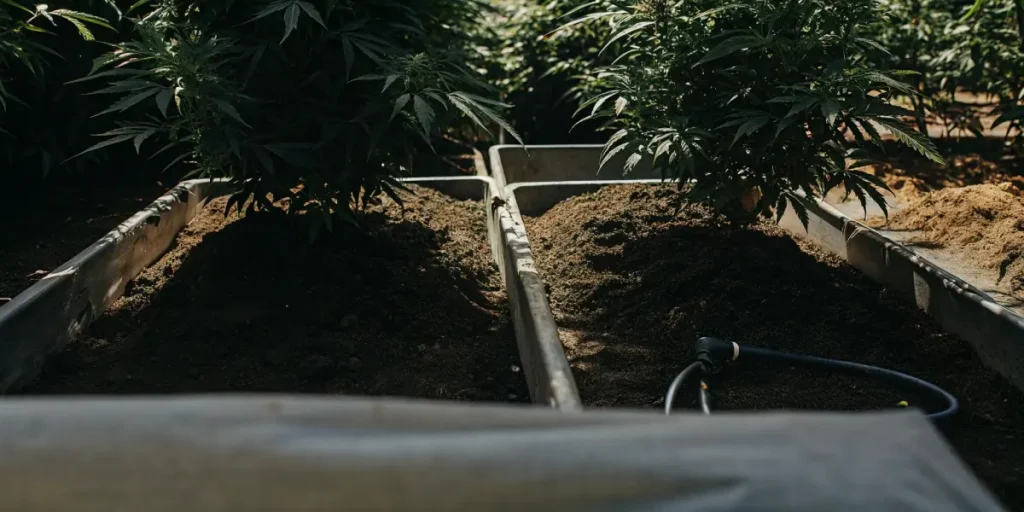
Micronutrients: The Hidden Helpers
Besides the macronutrients, cannabis plants require various micronutrients like iron, manganese, and zinc. While they are needed in smaller quantities, they play vital roles in enzyme function, photosynthesis, and overall plant metabolism. Using the best cannabis soil can help ensure these essential micronutrients are available in balanced proportions, promoting healthy growth and maximum yield.
Aeration and Drainage: Keys to Healthy Roots
The Importance of Well-Draining Soil for Growing Marijuana
Selecting the best soil for growing weed and marijuana is a pivotal decision for any cultivator. Among the key factors to consider, well-draining soil stands out as a fundamental component. This crucial aspect ensures that your cannabis plants receive the right balance of moisture, oxygen, and nutrients, all of which are vital for healthy growth and robust yields.
Preventing Waterlogged Roots
One of the primary benefits of well-draining soil is the prevention of waterlogged roots. When soil retains water excessively, it suffocates the roots, hindering their ability to access oxygen. This leads to a host of problems, including root rot and nutrient deficiencies. With well-draining soil, excess water is efficiently carried away, allowing the roots to breathe and absorb nutrients effectively.
Optimizing Nutrient Uptake
In the quest for the best soil for growing weed and marijuana, it is crucial to consider how nutrients are delivered to the plants’ roots. Well-draining soil facilitates the even distribution of essential elements, ensuring that your cannabis plants receive a balanced diet. This leads to healthy foliage, robust root systems, and ultimately, higher yields.
Encouraging Beneficial Microorganisms
Well-draining soil fosters a thriving ecosystem of beneficial microorganisms. These microscopic organisms play a crucial role in breaking down organic matter, releasing nutrients, and protecting plants from harmful pathogens. By creating an environment where these microorganisms can flourish, you’re creating a self-sustaining system that supports the overall health of your cannabis plants.
Preventing Soil Compaction
Over time, soil can become compacted, especially in high-traffic areas or if it lacks proper aeration. Compacted soil inhibits root growth and restricts the movement of water and nutrients. Well-draining soil resists compaction, which provides a loose and friable environment where roots can spread out and explore.
Promoting Healthy Microbial Activity
The microbial activity within soil is a cornerstone of a successful cannabis garden. Well-draining soil creates an environment where beneficial bacteria and fungi can thrive. These microorganisms contribute to the decomposition of organic matter, nutrient cycling, and disease suppression. In turn, this promotes a healthy and vibrant ecosystem within your soil, directly benefiting your cannabis plants.
Adding Amendments for Improved Aeration
Amendments like perlite, vermiculite, and coarse sand can enhance soil structure, allowing for better airflow to the roots. These additions also aid in water retention, ensuring that your plants receive the moisture they need without becoming waterlogged.
Soil Testing and Amendments
How to Test Your Soil for Cannabis
Regular soil testing is essential for monitoring nutrient levels and pH. Home testing kits are readily available and can provide accurate insights into your soil’s composition. Based on the results, you can make the necessary amendments to create an optimal growing environment.
Adjusting pH and Nutrient Levels
If your soil’s pH is too high or too low, you can adjust it using pH-balancing products. Additionally, organic amendments like compost, bone meal, or bat guano can be incorporated to address specific nutrient deficiencies.
Importance of Compost and Organic Matter
Building Healthy Soil with Compost: Enhancing the Best Soil for Growing Weed
Compost is often referred to as “black gold” among gardeners, playing a pivotal role in creating the best soil for growing weed outdoors. For those interested in combining their love for gardening with gourmet edibles, check out our guide on Best Chocolate Bar Weed: A Gourmet Cannabis Experience. Let’s delve into how compost enriches the soil, making it an essential component for successful cannabis cultivation.
Nutrient-Rich Boost
Compost is a treasure trove of nutrients that are essential for plant growth. It contains a balanced blend of macro and micronutrients, including nitrogen, phosphorus, potassium, calcium, and various trace elements. When incorporated into the soil, compost releases these nutrients gradually, providing a sustained source of nourishment for your cannabis plants.
Improving Soil Structure
One of the key benefits of compost is its ability to enhance soil structure. In the context of the best soil for growing weed and marijuana, this is paramount. Well-structured soil allows for proper root development, oxygenation, and drainage. It creates an environment where roots can easily access nutrients, water, and oxygen all crucial elements for healthy plant growth.
Enhancing Water Retention
Maintaining adequate moisture levels is essential for cannabis plants, especially during the flowering stage. Compost acts like a sponge, improving the soil’s water-holding capacity. This means that even in arid climates or during dry spells, the soil retains moisture, ensuring that your plants receive a consistent water supply.
Encouraging Beneficial Microorganisms
Compost is teeming with beneficial microorganisms such as bacteria, fungi, and protozoa. These microscopic allies play a crucial role in nutrient cycling and disease suppression. They create a thriving soil ecosystem that supports plant health and vigor. In the best soil for growing weed and marijuana, this microbial activity is particularly vital for maximizing yield and potency.
Balancing pH Levels
Compost has a natural buffering effect on soil pH. It helps to stabilize pH levels, ensuring that they remain within the optimal range for cannabis cultivation. This is especially beneficial for outdoor growers who may be dealing with soils that have fluctuating pH levels due to environmental factors.
Reducing Environmental Impact
Using compost in your cannabis garden is an eco-friendly practice. It reduces the need for chemical fertilizers, which can have negative impacts on soil health and the broader environment. By enriching the soil naturally, you contribute to a more sustainable and regenerative approach to cannabis cultivation.
Incorporating Compost into Your Growing Routine
To harness the full benefits of compost, mix it thoroughly into your chosen soil blend or spread it as a top dressing. For the best soil for growing weed and marijuana, aim for a compost-to-soil ratio of about 20-30%. This ensures a nutrient-rich substrate that supports robust and healthy cannabis plants throughout their life cycle.
Mulching: Benefits for Outdoor Cannabis
Mulching provides a protective layer on the soil’s surface, reducing moisture loss, suppressing weeds, and regulating soil temperature. Organic mulches like straw or wood chips also break down over time, enriching the soil with valuable organic matter.
Commercial vs. Homemade Soil Mixes
Pros and Cons of Commercial Mixes
Commercial soil mixes are convenient and often pre-mixed with a balanced blend of nutrients. They can be a time-saving option for growers. However, they may come at a higher cost compared to homemade mixes.
DIY Soil Blends: Tips and Recipes for the Best Soil for Growing Marijuana
Creating your own soil blend is a fantastic way to tailor the growing medium to the specific needs of your cannabis plants. By using high-quality ingredients and following tried-and-true recipes, you can ensure that your plants have the best possible environment to thrive. Here are some tips and recipes for crafting the best soil for growing weed and marijuana:
1. Start with a High-Quality Potting Soil:
Begin your DIY soil blend with a reputable, nutrient-rich potting soil. Look for a mix that is well-draining and free from pests or diseases. This will serve as the foundation for your custom blend.
2. Incorporate Organic Matter:
Compost is an invaluable addition to any soil mix. It provides a rich source of nutrients and beneficial microorganisms that support healthy plant growth. Aim to include about 20-30% compost in your blend.
3. Balance with Perlite or Vermiculite:
To ensure proper aeration and drainage, add perlite or vermiculite to the mix. These lightweight materials create air pockets in the soil, allowing the roots to access oxygen and preventing waterlogged conditions.
4. Boost Nutrient Content with Amendments:
To enhance the nutrient profile of your soil, consider incorporating organic amendments like bone meal, blood meal, or fish meal. These natural sources of nutrients will gradually release and provide a steady supply of essential elements.
5. Harness the Power of Worm Castings:
Worm castings are a powerhouse of nutrients and beneficial microorganisms. They improve soil structure, enhance nutrient availability, and promote vigorous plant growth. Adding a generous amount of worm castings will greatly benefit your cannabis plants.
6. Consider Kelp Meal for Micronutrients:
Kelp meal is a fantastic source of micronutrients such as iron, manganese, and zinc. These trace elements are crucial for enzyme function and overall plant health. Including kelp meal in your blend ensures that your cannabis plants have access to a wide range of essential nutrients.
7. Balance pH Levels:
To create the best soil for growing weed and marijuana, it’s important to maintain the appropriate pH level. Use pH testing kits to monitor and adjust the pH as needed. Most cannabis plants thrive in slightly acidic soil with a pH range of 6.0 to 7.0.
Recipe for a High-Quality DIY Soil Blend:
- 50% High-Quality Potting Soil
- 30% Compost
- 10% Perlite or Vermiculite
- 5% Worm Castings
- 5% Kelp Meal
- Optional: Organic Amendments (bone meal, blood meal, fish meal) as per manufacturer’s instructions.
Instructions:
- In a large container, combine the potting soil, compost, perlite or vermiculite, and worm castings. Mix thoroughly to ensure an even distribution of ingredients.
- Gradually add the kelp meal, ensuring it is well-incorporated into the mix.
- If using additional organic amendments, follow the recommended application rates provided by the manufacturer.
- Test the pH of your soil blend and make any necessary adjustments.
- Your DIY soil blend is now ready to be used for planting your cannabis seeds or transplants.
By creating your own custom soil blend, you have the flexibility to cater to the specific needs of your cannabis plants. This recipe provides a balanced mix of nutrients, aeration, and drainage for optimal growth and development. Remember to monitor your plants closely and adjust your soil mix in subsequent grows based on their performance.
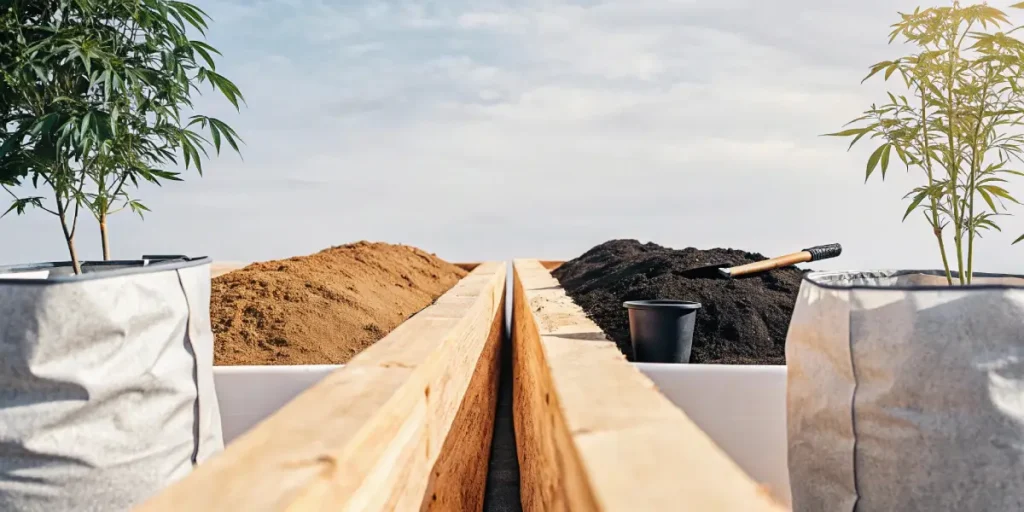
The Ideal Soil for Your Outdoor Cannabis Garden
In conclusion, selecting the right soil for your outdoor cannabis garden is a critical step in ensuring a successful and abundant harvest. Whether you opt for organic blends or prefer to create your own custom mix, prioritizing proper aeration, drainage, and nutrient balance will set the foundation for healthy, thriving plants. Remember to regularly test and amend your soil to maintain optimal growing conditions. With the right soil, you’ll be well on your way to a rewarding cannabis cultivation experience.
If you’re looking for more information on the best Outdoor Cannabis Seeds, be sure to check out our in-depth guide on Outdoor Cannabis Seeds Tips.
FAQs
What is the best soil for growing weed outdoors?
The best soil for growing weed outdoors is one that provides excellent drainage, proper aeration, and a balanced mix of essential nutrients. Organic soil enriched with compost, worm castings, and natural amendments is highly recommended, as it promotes healthy microbial activity and supports robust plant development throughout the cannabis life cycle.
Should I use organic soil or potting mix for growing cannabis?
Both organic soil and potting mix have their advantages. Organic soil is ideal for growers seeking a natural, sustainable method, as it enhances flavor and aroma while supporting soil health. Potting mix, on the other hand, offers precise control over pH and nutrient levels, making it suitable for growers who prefer to fine-tune their cultivation process. Your choice depends on your gardening style and goals.
What nutrients should the best soil for growing weed contain?
The best soil for growing weed should contain a well-balanced mix of nitrogen (N), phosphorus (P), and potassium (K)—the “Big Three” essential nutrients. It should also include important micronutrients such as iron, zinc, and manganese. A rich compost base and amendments like worm castings and kelp meal further enhance nutrient availability and support healthy plant growth.



